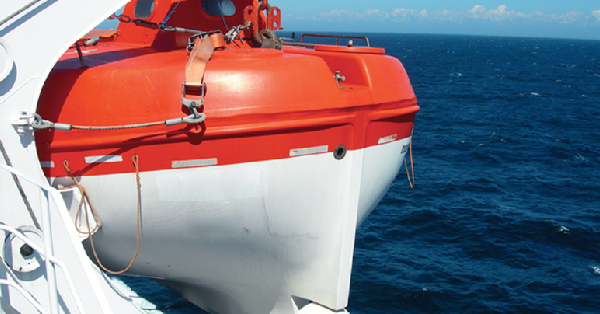The Sub-Committee finalized amendments addressing the ventilation of survival craft for totally enclosed lifeboats, including related amendments to the Revised recommendation on testing of life-saving appliances (resolution MSC.81(70)).
SSE 10 will continue to discuss any compelling need on such ventilation requirements for partially enclosed lifeboats and liferafts. The aim is to ensure a habitable environment is maintained in survival craft at all times to enhance survivability.
The draft amendments will apply to totally enclosed lifeboats installed on or after 1 January 2029, so as to allow ample time for Administrations and manufacturers to implement the new ventilation requirements.
The Sub-Committee also finalized a number of draft amendments to the LSA Code and associated instruments, including resolution MSC.81(70), as appropriate, concerning:
- the lowering speed of survival craft and rescue boats for cargo ships;
- single fall and hook systems with on-load release capability;
- thermal performance of immersion suits on the low-temperature tolerance time threshold; and
- in-water performance of SOLAS lifejackets.
The Maritime Safety Committee (MSC) will be invited to approve the above draft amendments at its 107th session, for subsequent adoption.
Minimizing incidence and consequences of fires on board ro-ro passenger ships
The Sub-Committee completed its review of SOLAS chapter II-2 and associated codes, including the Fire Safety Systems (FSS) Code, to minimize the incidence and consequences of fires on board ro-ro passenger ships. The draft amendments agreed by the Sub-Committee will be forwarded to MSC 107, for approval and subsequent adoption.
The draft SOLAS amendments will mainly apply to passenger ships constructed on or after 1 January 2026 and include requirements for:
- a fixed fire detection and fire alarm system to be provided for the area on the weather deck intended for the carriage of vehicles;
- an effective video monitoring system shall be arranged in vehicle, special category and ro-ro spaces for continuous monitoring of these spaces;
- structural fire protection in passenger ships carrying more than 36 passengers, including fire insulation of boundary bulkheads and decks of special category and ro-ro spaces; and
- a fixed water-based fire-extinguishing system based on monitor(s) to be installed in order to cover weather decks intended for the carriage of vehicles.
The draft amendments to the FSS Code include specifications of fixed water-based fire-extinguishing on ro-ro passenger ships having weather decks intended for the carriage of vehicles as required by SOLAS chapter II-2.
Draft amendments to the Revised Guidelines for the design and approval of fixed water-based fire-fighting systems for ro-ro spaces and special category spaces (MSC.1/Circ.1430/Rev.2) were also agreed.
Fire protection of control stations and cargo control rooms on cargo ships
The Sub-Committee finalized draft amendments to regulation 7 of SOLAS chapter II-2 (Detection and alarm) and associated MSC.1/Circ.1456, addressing fire protection of control stations and cargo control rooms on cargo ships to enhance fire safety in such locations.
2023 Diving Code finalized
The Sub-Committee finalized the draft 2023 Code of Safety for Diving Systems, for submission to MSC 107 for adoption. The new Code revises the existing one, adopted in 1995 by the IMO Assembly by resolution A.831(19)), as well as incorporates a revision of the Guidelines and specifications for Hyperbaric Evacuation Systems (resolution A.692(17)).
Safe operation of onshore power supply – interim guidelines agreed
The Sub-Committee finalized draft interim guidelines on safe operation of onshore power supply (OPS) service in port for ships engaged on international voyages, for submission to MSC 107, with a view to approval.
The aim of the interim guidelines is to address the need for global standards for the process of providing shoreside electrical power to a ship at berth while its main and auxiliary engines are turned off.
In addition to choosing cleaner, greener fuels, utilizing onshore power supply (also known as “cold ironing”, “alternative maritime power” and “shore-side electricity”) is another solution to reducing air pollution and emissions from ships, as well as limiting local noise.









































